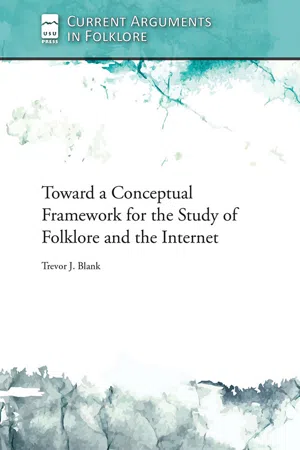
Toward a Conceptual Framework for the Study of Folklore and the Internet
Trevor J. Blank
- English
- ePUB (disponibile sull'app)
- Disponibile su iOS e Android
Toward a Conceptual Framework for the Study of Folklore and the Internet
Trevor J. Blank
Informazioni sul libro
Trevor Blank broke new ground for the field of folklore studiesin this essayby rationalizing the study of the internet as an important area of expressive vernacular culture. Pushing back against traditionalists who dismissed the digital as simply the domain of technicians and mass media, Blank argues that "from the earliest moments of the modern Internet's existence, folklore was a central component of the domain, moderating the intersection of computer professionals with hackers, newfangled lingo, and the dispersal of stories, pranks, and legends." With this essay and the volume it introduces, Blank theorizes the internet as an important analytic venue for folklorists, and sets the agenda for digital folklore research.Utah State University Press's Current Arguments in Folklore is a series of thought-provoking, short-form, digital publications made up of provocative original material and selections from foundational titles by leading thinkers in the field. Perfect for the folklore classroom as well as the professional collection, this series provides access to important introductory content as well as innovative new work intended to stimulate scholarly conversation.
Domande frequenti
Informazioni
References
Indice dei contenuti
- Toward a Conceptual Framework for the Study of Folklore and the Internet
- Notes
- References
- About the Author